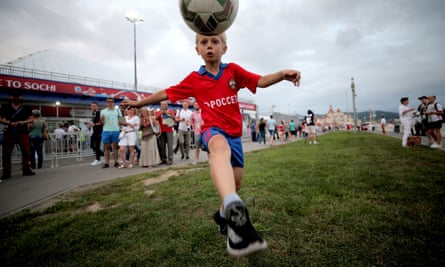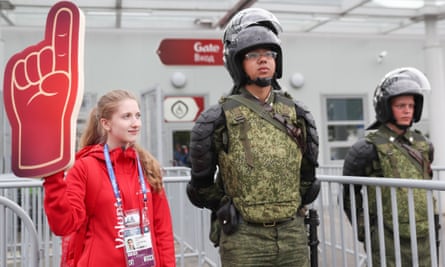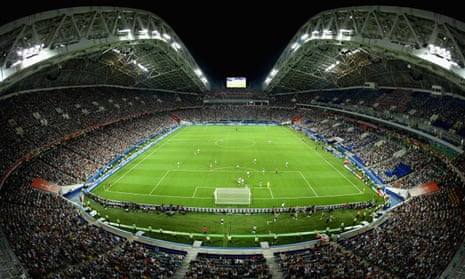The Confederations Cup is drawing to a close, and overall Russians will feel pleased at how the eight-team warm-up tournament has gone – except for the performance of the home team. On Sunday evening, Germany take on Chile in the late sunlight of a St Petersburg summer evening, and then that will be it until 14 June next year, when the Fifa circus descends on Russia for the main event.
Intended as a scaled-down dress rehearsal to test World Cup hosts a year before the real thing, this tournament for Russia has been about trying to push back against the international perception of the country. That has been shaped mainly by horror stories of Russia’s own making: hooliganism, racism, labour rights, and that is before we even start thinking about yet another Russian doping allegation.
The effort Russia has made to present a welcoming face to fans during this tournament was evident from the opening game in St Petersburg, when the hosts took on New Zealand. As will be the case with the World Cup next year, any fan with a ticket was eligible to bypass Russia’s cumbersome visa process, and smiley volunteers at the airports and train stations were on hand to direct visitors to free transport to the stadium.
Signs in English have sprung up across the host cities, and help points placed at strategic locations in the Moscow and St Petersburg metro systems. For a country where for years the welcome has consisted of silent, glowering border guards followed by the running of a gauntlet of avaricious taxi drivers, it is a remarkable improvement.
The construction of St Petersburg’s spaceship-like new stadium has been a remarkable saga. It has run nearly a decade over schedule and has been plagued by allegations of corruption, the deaths of workers and the use of North Korean slave labour. Indeed, it has taken so long to build that parts of it are already rusting a couple of months after opening, while a giant leak appeared inside during the opening game. The pitch was re-laid after concerns were raised that it would vibrate too much, and Cristiano Ronaldo complained that the grass was too long.

It was easy to forget about all of this, though, while walking towards the stadium in the warm sunshine along a promenade dotted with fountains and lined with trees and yet more volunteers pointing the way and exchanging beaming smiles with fans. The happy demeanour of the endless rows of volunteers will be the enduring memory of the tournament for many fans.
“Russians have a reputation for being depressed or aggressive, and I think the World Cup is going to show everyone that this is nonsense,” said Sergei, a 37-year-old computer programmer from Sochi attending the Germany-Mexico semi-final.
One young woman in Sochi told me her entire university class had been “recommended” to become volunteers by their tutor, on the understanding that it was not really all that voluntary. But most looked genuinely happy to be part of the tournament, even if the closest they got to the action was waving a giant foam hand to herd fans in the general direction of the stadium.
At times, this aspirational, friendly version of Russia collided with the unmovable wall of the real thing. Attempting to access the media centre for the opening match, I found a metal grille slammed firmly in my face and an angry police officer who would answer only “Wait!” to any question. The volunteers were still smiling but had no answers as to what was going on. After a while, it became apparent that Vladimir Putin was about to land in his helicopter, and for that reason access to the media centre was closed for a full 40 minutes, meaning myself and a number of other reporters missed the kick-off.
In Moscow, the festival atmosphere was tempered somewhat by columns of riot police on the way to the stadium and public service announcements barked through loudspeakers at ear-splitting volume, while in Sochi atmosphere of any kind was hard to come by. The Fisht Stadium, built for the 2014 Winter Olympics, is an impressive arena situated between the Black Sea and the Caucasus mountains, but the venue is an hour’s drive from the town itself, and the surrounding Olympic Park, with its shiny, deserted venues, has the feel of a parking lot filled with spaceships. Kazan, a sports-mad city where the local side Rubin have a history of appearing in European tournaments, provided the best crowd atmosphere.
With long intercontinental journeys for all fans except those of Germany and Portugal, it was hardly surprising that not many made it to Russia for what is, after all, a fairly meaningless tournament. Attendances were low, with even Russia’s matches not fully sold out. When the home side crashed out after two defeats from three games, the atmosphere became even flatter.
The fans who did make it to Russia seemed happy, nonetheless. While many hit minor logistical hurdles, real disasters were few and far between. There was the Chilean journalist Diego Saez, who was charged 50,000 roubles (£650) for the cab fare from the airport to the city – a £20 ride. But in another sign that the authorities were bending over backwards to ensure good publicity before the tournament, the police tracked down the driver, who handed all the money back and offered to drive Saez around for free for the duration of the tournament, presumably with the “encouragement” of the police.

Still, the warm-up tournament featured only four cities, and there are big questions about how ready outposts such as Saransk and Rostov are to host the World Cup, and whether the country’s infrastructure will be up to the job. It is all very well offering fans free train travel between cities, but some of those train rides take 48 hours or more.
With a year to go, Russia has two main concerns: hoping the home side has a respectable tournament, which on the showing here may be a big ask, and successfully presenting a friendly, competent Russia to the world. It will not be the first time that Russia has tried to impress on the sporting stage: the 2014 Winter Olympics were positioned as a message to the world, and to Russians themselves, that the country was finally back on its feet following the long period of decline after the Soviet collapse.
In the end, the Olympics did the job for internal consumption but resonated less internationally, especially in hindsight, when it turned out Russian medal successes were possibly down to an audacious and sinister doping programme. In the end, Russia’s world standing in 2014 was determined not on the ski runs of Sochi but in the annexation of Crimea and the subsequent sanctions and war in Ukraine: Russia was indeed back, but not in the way Putin had intended.
This time, both sides go into the event with fewer illusions, and expectations are already low. Many Russians are convinced that negative coverage of the country is down to sinister “Russophobic” interests in the west determined to do them down whatever the reality is.
Hooliganism and racism were not a problem during the Confederations Cup and may not be one at the World Cup either, but Russian officials often do not help themselves, with a Football Union official cheering on the violence in Marseille at Euro 2016, and a Confederations Cup welcome event featuring banana-wielding “Cameroonians” in blackface.
There is still a range of problems for Russia to overcome if the World Cup is to be remembered for sporting reasons and not controversies, but the few fans who made it to the country for the Confederations Cup were in optimistic mood.
“I was thinking twice about coming because I was quite worried about Russia,” said Francisco Garcia, a Mexican student who lives in France, and who attended Thursday’s semi-final in Sochi. “But it’s been amazing. I’m going to start saving up for the World Cup, starting tomorrow.”
Sánchez key in final as Chile take on young Germany
Sunday’s Confederations Cup final is set to be a game of contrasts. Germany lead the scoring chart at the tournament with 11 goals, while Chile boast the best defensive record. The world champions brought the youngest squad to Russia – eight of their players were eligible for the under-21 team that won the European Championship on Friday – while the South Americans have an average age approaching 30.
“These are not idle words,” said the Chile midfielder Arturo Vidal. “We have proven our value on the pitch. We beat Argentina [in the 2016 Copa América final], who are one of the best teams, and the other day we beat Portugal, who are the European champions. If we win tomorrow we might be the best team in the world.”
Chile’s Alexis Sánchez could threaten an inconsistent German defence, which has conceded five goals during the tournament and has suffered from goalkeeping uncertainty. Although the Arsenal forward has been below his world-class best in Russia, unsettled by claims of an impending move to Manchester City, he will prove crucial if the game is as open as the two thrilling semi-finals.
With both nations facing their fifth match in two weeks, fatigue could also be a factor. While Germany have had one fewer day’s rest, Chile played 120 minutes against Portugal on Wednesday. La Roja’s high-intensity style and veteran squad could count against them, although their manager, Juan Antonio Pizzi, insisted “energy levels will not be decisive”. Kieran Pender in St Petersburg
